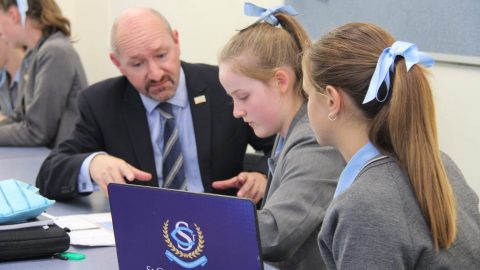From the Director of Curriculum Innovation and Development

Over the recent break, I had the good fortune to spend some time visiting schools in the UK, speaking with Principals and Directors of Curriculum, sharing ideas and being open to new ones. I visited a range of schools from the very private to the most comprehensive, and spent an entire day at an Academy school where high performing schools are linked to low performing schools.
One interesting experience was a visit to the King Edward VI School in Stratford – the school where William Shakespeare went. I had not ever thought too much about Shakespeare’s education, but on learning more I think we can learn a lot from 500 years ago. The aim of Tudor schooling was that ‘good literature and discipline might be diffused and propagated throughout all parts of our Kingdom’: literacy and moral education were the foundations of the commonwealth. Children would learn about wisdom, virtue and civic action from books, classic texts and studies.
With deep thanks to the King Edward VI School, here is a summary of education in Shakespeare’s day: Seven-year olds started school at six in the morning in summer and seven in winter, and studied from dawn until dusk all year round, six days a week, twelve months a year. They spent 2,000 hours in school, more than double current school hours. William spent seven years at this school from 1571 to age 14 1578, equivalent of 14 years’ worth of school hours today, and had been to primary school from age five to seven to learn lessons in behaviour, literacy, scripture and manners, ‘until they can read perfectly, pronounce and sound their words plainly and distinctly’. All seven masters who taught there between 1554 and 1582 were Oxford or Cambridge graduates.
The Curriculum: Students at the school studied few subjects in great depth to high rigour, with total immersion in classical language and literature. The Renaissance was the driving force behind the syllabus: Religious Education, Latin, Literature, Arithmetic, English Grammar, Philosophy and Theatre, learning entire textbooks by heart, including one called ‘An Introduction of the Eight Parts of Speech.’
The Teaching: Shakespeare learned through a rigorous regime of sermons, rote memorisation, relentless drills, endless repetition, copying and imitation, textbooks, daily analysis of texts, extended practice exercises, dictation, composition, declamation and twice-weekly examinations. Forty hours a week were spent reading, memorising and writing. Children sat in rows facing the schoolmaster at the front of the room. There was continual instruction in the art of remembrance, in systems of memory or ‘mnemonics’. Catechism – combining written summaries with oral chants – was used as a mode of instruction and memorisation. The culture prized eloquence: many hours were spent by students compiling long lists of synonyms. Debate, dialogue and drama were foundations of Elizabethan teaching and staples of learning.
LOTE: The central educational principle was immersion. The essence of the system of foreign language learning was translation, translation, translation: double translation, backwards and forwards between English and Latin, day in, day out. The result was a command of Latin in leaving school at 15 that was better than a University graduate in Classics today: fluency, even in conversation.
English: Collections, memorisation, imitation exercises and composition drills are four of the ways that Elizabethan grammar schools taught writing. Commonplace books were copied. Out of imitation came invention. Students were required to imagine they were a character from classical mythology, literature or history: persuade Caesar to cross the Rubicon; convince Cleopatra to choose suicide over slavery; sway the senate to ostracise Antony for monarchical-dictatorial intent.
On reflection, perhaps along the way we may have occasionally thrown out the baby with the bath water. I for one believe that there is still much to be learned from the education in England some 500 years ago that enabled our greatest ever writer to create the greatest plays ever written.


